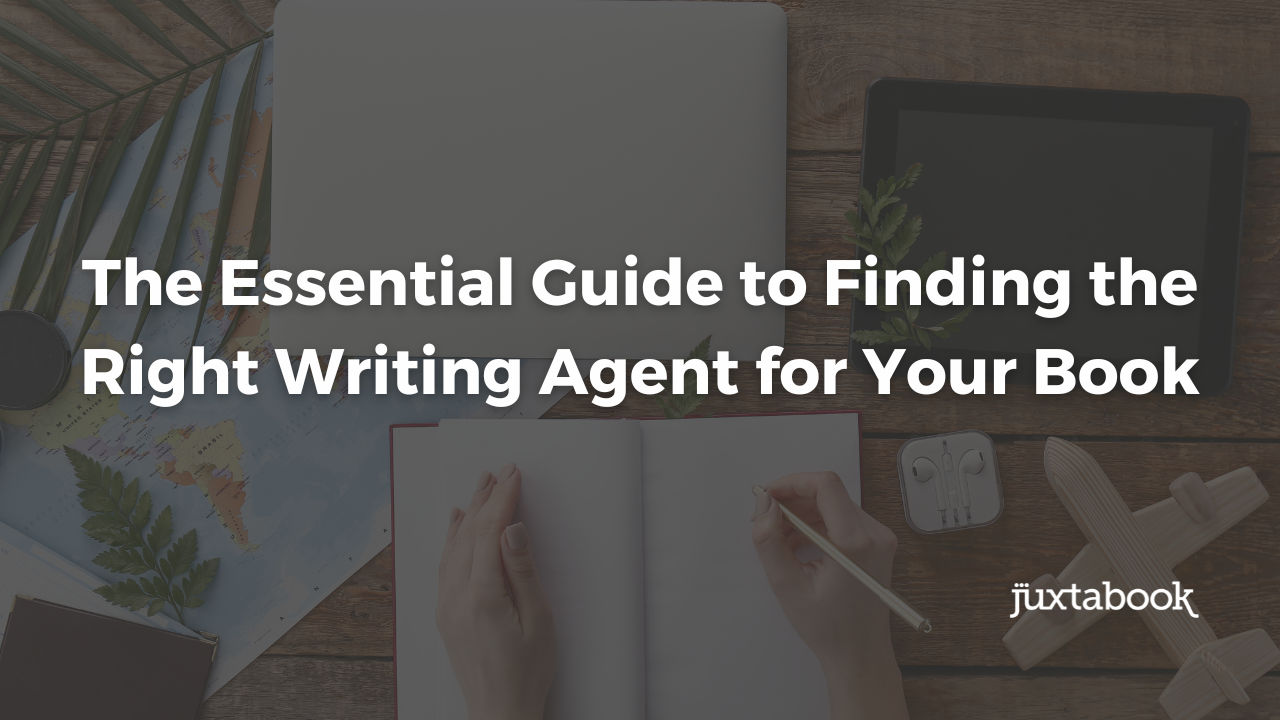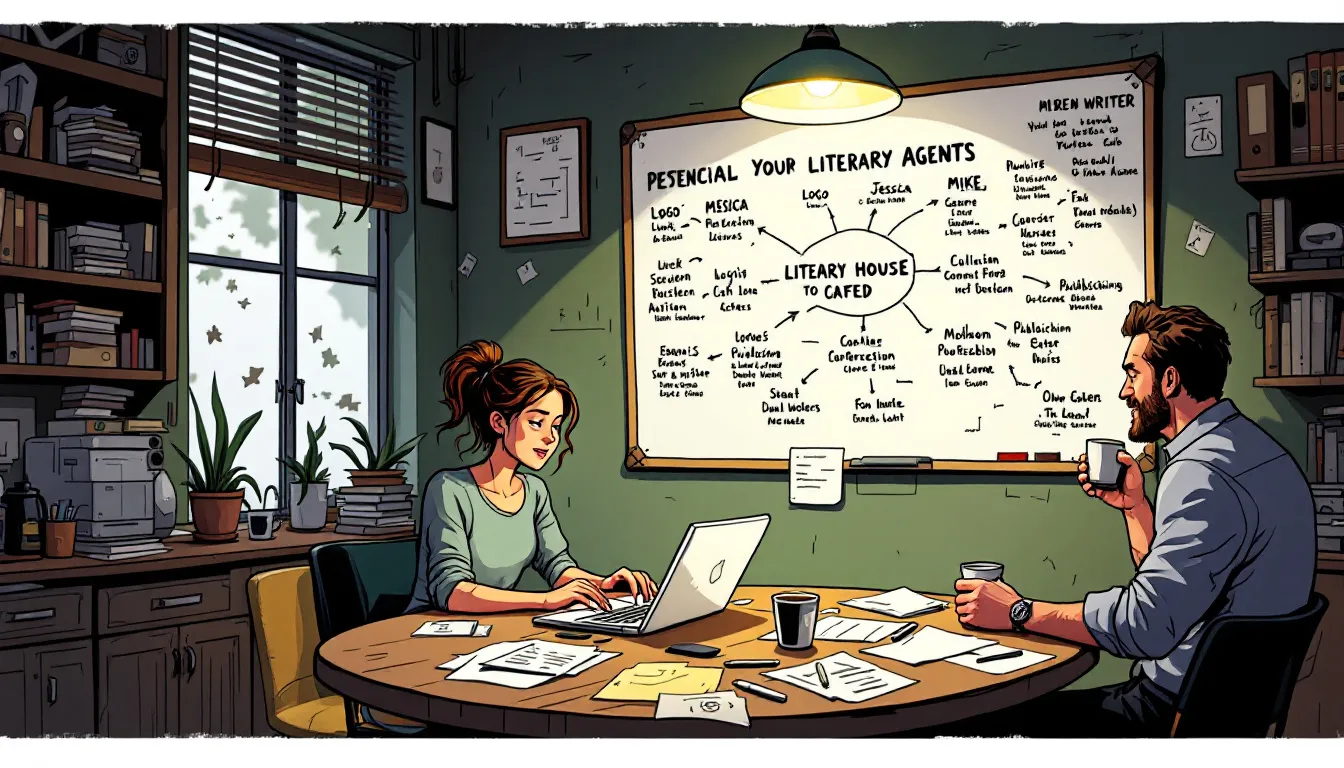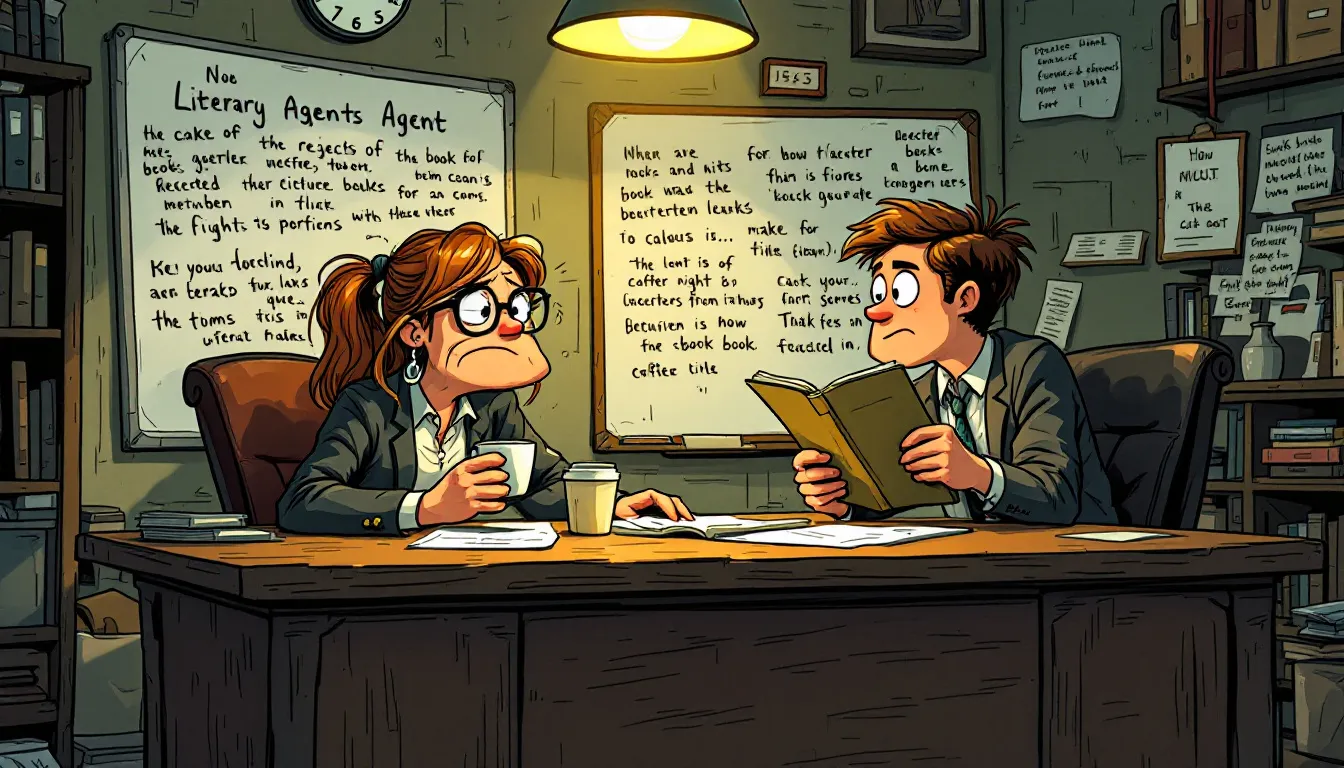The Essential Guide to Finding the Right Writing Agent for Your Book
May 16, 2025
How to Find the Best Writing Agent for Your Manuscript
Are you wondering how to find the perfect writing agent for your manuscript? A lot of your success depends upon finding and securing your dream agent, someone who understands your vision and goals. A writing agent can introduce you to publishers, negotiate deals and offer guidance. This guide will outline what an agent does, why you might need an agent, and help you choose the right agent for you.
Key Points
-
Literary agents are key to navigating the publishing industry, negotiation skills, guidance and market opportunities for writers.
-
A polished and professionally structured manuscript or proposal is what grabs an agent’s attention, along with following submission guidelines.
-
Researching agents and customizing query letters increases your chances of getting representation.
What does a Writing Agent Do

Literary agents are the bridge between writers and publishers in the publishing industry. These dedicated experts work hard to get the best possible book deal for their clients by negotiating contracts that ensure fair pay. Imagine having your very own literary agent who does the hard work to get your book into the right hands in publishing. You need to research agents who specialize in your genre and have the same goals so you can be sure to get an agent whose vision matches yours.
Beyond just getting deals, a good agent offers guidance and support throughout the proposal and manuscript refinement processes, helping to increase your book's marketability. Having a good literary agent can be the key to becoming a bestseller, breaking into new markets, or getting rights for translations and screen adaptations. A literary agent navigates the complexities of publishing while helping authors avoid the agony of repeated rejection letters.
Understanding these roles is key when looking for the right agent. A good literary agent isn’t just about selling books. They are passionate advocates for a writer’s work and fully invested in their success.
Do you need a literary agent?
The need for a literary agent is largely dependent on your publishing goals. If getting a contract with established publishers is the goal, then getting an agent is almost mandatory. Literary agents give you access to their industry connections, which greatly increases your chances of getting published. Where does your book fit into the world of literary fiction or commercial genres? Knowing where your work sits helps when approaching agents and getting the right representation.
Not all writers need a literary agent. Those writing for niche markets or fields like academia may at times, bypass this step. Authors who self-publish or target very narrow and specific audiences might find it’s better to go straight to their audience.
It’s also worth finding out how the authors you admire have shaped their careers. This might clarify whether working with an agent fits with your professional goals. If wide distribution and big advances with mainstream success are your goal, working with a literary agent will be very beneficial. On the other hand, if you prefer to cater to niche audiences or are confident in managing the publishing process yourself, self-publishing can be just as fulfilling.
Benefits of a Literary Agency
Working with a literary agent can make a big difference for authors seeking publication. Here are some key benefits:
-
Industry Expertise: Agents have deep knowledge of the publishing industry, including trends, market demands, and what publishers are looking for. Their insight can help position your manuscript for the best chance of success..
-
Access to Top Publishers: Literary agents have relationships with top publishers like Penguin Random House which can increase your chances of getting published by a reputable publisher.
-
Negotiation Skills: Skilled negotiators, literary agents can get authors better book deals, higher advances and better royalties. Their experience ensures you get the best possible terms for your work.
-
Career Guidance: Beyond just getting a book deal, literary agents offer career guidance, helping authors develop their writing skills and build their author platform. They can also advise on everything from marketing strategies to long-term career planning.
-
Time-Saving: Literary agents handle the business side of publishing, including submissions, negotiations and contract management. This means you can focus on your writing, saving time and effort.
Do you need a Literary Agent?
Whether you need an agent depends on your publishing goals. If you’re aiming for a deal with a major publisher, having an agent is generally essential. Their industry connections and expertise can greatly increase your chances of success..*
Traditional Publishing: If getting your book published by a traditional publisher is your goal, having a literary agent is almost a necessity. Literary agents have the connections and expertise to navigate the complexities of traditional publishing.
-
Genre: If you’re writing in a crowded genre like science fiction or historical fiction, a literary agent can help you stand out. They know what publishers are looking for and can position your manuscript accordingly.
-
Book Proposal: For non-fiction authors, a well-crafted book proposal is key. Literary agents can help you develop a proposal and pitch it to publishers, increasing your chances of success.
-
Self-Publishing: While self-publishing gives you more control, a literary agent can still be valuable. They can guide you through the self-publishing process and offer advice on marketing and distribution.
Understanding Your Book’s Genre and Market Fit
Knowing your book’s genre and market fit is essential for finding the right literary agent and publisher. Here are some tips to help you identify your book's genre and place in the market:
-
Research: Start by researching the different book genres and subgenres to categorize your book accurately. Knowing where your book sits in the market is key to targeting the right literary agents.
-
Analyze: Visit bookstores and online retailers to find comp titles—books similar to yours in genre and theme. Analyzing these titles will help you understand where your book fits in the market and what makes it unique. For more on creating a captivating book title, check out this guide on writing the perfect book title.
-
Identify: Identify your book’s unique selling points and market appeal. What sets your book apart from others in the same genre? Highlight these aspects and your manuscript will be more attractive to agents.
Researching the Industry and Trends
Researching the industry can help you find the right literary agent to get your book published. Here are some tips for researching the industry:
-
Publisher's Marketplace: Use Publisher's Marketplace to research publishers, agents and book deals. This platform gives you insight into the industry and can help you find the right agents.
-
Literary Hub: Stay up to date with the latest industry news and trends by following Literary Hub. This platform offers articles, interviews and industry updates to keep you in the know about the publishing world.
-
Twitter: Follow literary agents, publishers and authors on Twitter to stay up to date with the industry. Many agents and publishers share valuable insights and updates on social media.
Submitting Your Manuscript

Before you query agents, your manuscript must be flawless. Agents expect either a polished, professional manuscript or a book proposal, which will vary depending on whether you’re writing fiction or non-fiction. Be sure this initial step meets their standards as anything less may result in instant rejection.
For fiction authors, it’s usually expected to submit the full manuscript. Non-fiction authors are usually required to supply a book proposal along with sample chapters and an outline that demonstrates the scope and structure of the project. You must present your writing in a digestible format that also conforms to industry standards.
Compliance with each literary agency’s submission guidelines cannot be overstated. They are crucial for success. Each agency has its own rules regarding formatting and other details like how many sample chapters to include—ignoring these will harm your chances.
Now let’s break down what sets a full manuscript apart from a book proposal in detail.
Full manuscript vs. book proposal
Understanding the differences between submitting a book proposal and full manuscript is imperative. Fiction requires a full manuscript submission which should be in industry standard format—double-spaced text in Times New Roman 12 pt font with page numbers.
A book proposal is more complex and consists of two parts: sample chapters double-spaced for reading and a business focused section. This latter part is single-spaced and outlines target audience, comparable titles on the market and how you will market your work.
While the purpose of providing publishers with a full manuscript is to show them your story from beginning to end, providing them with a book proposal is evidence of its potential success in the market. Preparing these documents correctly will greatly increase your chances of grabbing an agent’s attention based on their merits.
Submission guidelines
Literary agencies prefer email submissions and will outline the required contents, which often includes the first three chapters, a synopsis and a brief description of either the book’s setting or main character. You must follow the guidelines precisely.
If you ignore these, you will be rejected. Typical oversights are spelling mistakes, incorrect formatting and missing components from your submission package. These will show you as unprepared and unprofessional and will decrease the chances of a positive response.
It’s also important to note the response times mentioned in the submission guidelines, which can range from weeks to months. Knowing this will help you manage your expectations and plan your follow up accordingly. Following these guidelines shows your professionalism and increases the chances of your work being taken seriously.
Finding Potential Agents

Where preparing your manuscript is the first step, finding potential agents is the next step. Recognize your genre and sub-genre so you can find agents looking for manuscripts like yours, thereby increasing the chances of finding an agent suited for your work.
Start by finding agents who have sold books like yours. Dig into marketing categories and understand where your book fits in the publishing world. Present a researched query will show to potential agents not only that you have put effort into your submission but also that you have an understanding of where it sits in the market.
Make use of online directories to simplify this process. These platforms give you detailed information about different literary representatives: their tastes, client experiences and submission guidelines, useful insights as you look for representation to get published.
Using online directories
Online directories are great tools to find literary agents looking for new submissions. Some of the best directories include the Reedsy Directory, QueryTracker, Publishers Marketplace and Manuscript Wishlist (MSWL). These platforms give you information about agents and agencies making your agent search more efficient.
These platforms give you information about agents and agencies making your agent search more efficient.
The Reedsy Directory for example allows you to filter agents by genre, location and other criteria. QueryTracker helps you track agents’ responsiveness and manage your submissions. Publishers Marketplace gives you access to a ton of data on agents, editors and sales records. Manuscript Wishlist shows you what agents are looking for so you can tailor your queries better.
Evaluating agents' track record
To make sure an agent can negotiate good contracts and has the necessary industry connections, check their sales history. Look for a proven record of deals with major publishers by checking their agency’s website or platforms like Publishers Marketplace.
Also assess the breadth and variety of an agent’s client list. This will give you an idea of their literary tastes and if they represent writers you respect. Knowing who they represent will help you discern if your manuscript can be an addition to their roster.
Be careful of agents whose clients are mostly similar to you or your writing style or genre. This might seem beneficial at first but can lead to rejection because of too many similarities with existing authors they represent. The publishers they have worked with should be the ones you aspire to publish with. Doing this research will help you find agents who will champion your work well.
Red Flags to Watch Out for When Researching Literary Agents
Here are red flags to watch out for when researching literary agents:
-
Upfront Fees: Be wary of agents who charge upfront fees. Reputable literary agents earn their commission from book sales not from charging authors fees upfront.
-
Lack of Transparency: Be careful of agents who are unclear about their submission guidelines or commission rates. Transparency is a sign of professionalism and trustworthiness.
-
Poor Communication: Be wary of agents who are unresponsive or unprofessional in their communication. Good communication is key to a successful author-agent relationship and an agent who is hard to reach may not be the best fit for you.
By keeping these red flags in mind, it will be easier to avoid the pitfalls and find a literary agent who is reputable and a good fit for your work.
Personalized Query Letters

Now that you have found potential agents, it’s time to write your query letters. A query letter is an introduction and must be engaging and polished because you have one minute to pique the agent’s interest. This letter should present who you are and an overview of your manuscript while following each agency’s guidelines.
Tailoring your query letters to specific agents can increase your chances of getting representation. Showing you have put effort into understanding their interests shows you are serious about working with them. A well-prepared query letter helps you stand out and may tip the scale in your favor of not getting ignored..
Query letter elements
When writing a query letter, be sure to include the essential components. Start with a one-page introduction that briefly introduces yourself and your work. Keep it concise yet engaging, ensuring it effectively captures the heart of your manuscript.
Give the literary agent a synopsis of the main character and primary conflict in your story. This will give them an idea of what you’ve written and help them decide if they can represent it. Tailoring each query letter to individual agents by explaining why you chose them can also increase the chances of a yes.
End with a brief paragraph highlighting any writing achievements or relevant qualifications. This helps the agent understand your background and potential. A strong, well-crafted query letter can greatly improve your chances of securing representation.
Avoid common mistakes
When writing your query letters, be sure to avoid some of the most common pitfalls. One mistake is to use generic phrases while trying to personalize your letter. Be specific. Point out why you chose that agent and how your manuscript fits their tastes can make your query stand out.
Overlooking submission guidelines or committing simple errors like typos and poor formatting can give an unprofessional impression and decrease the chances of getting a positive response from agents. To avoid these traps and get better results with your submissions, attention to detail and following submission protocols are key.
Submitting Queries in Batches
It can be a great strategy to send your query letter to agents in small batches of 8-12 at a time. This allows you to gauge interest, refine your approach, and adjust your submission materials based on any feedback you receive.
This approach helps you avoid the frustration of mass rejections by giving you a chance to improve your query letter and proposal. If you notice common feedback, you are then able to make adjustments before sending out the next batch. You'll find that refining your submissions along the way can help boost your chances of landing an agent.
Timing and follow-up
When submitting queries, notice the response times indicated in the submission guidelines as they can vary greatly. Be patient during this period. If you don’t hear back after the timeframe has lapsed, a polite follow-up email is okay.
Your follow-up should be brief and courteous – just touch base regarding your initial submission and ask about its status. Doing so shows your professionalism and keeps your query top of mind for the agent. Just remember that in publishing, no news is no. But don’t let that stop you.
In cases where multiple follow-ups get no response, it may be a sign to reassess and possibly revise what you submitted earlier. Being persistent goes hand in hand with being flexible – use lack of feedback or constructive criticism as tools to hone what you offer when approaching new agents.
Dealing with Rejections and Silence
Rejection letters are part of the journey for writers to success, even for acclaimed authors have been rejected multiple times. Rejection letters are not a critique of your work’s merit. They are more an indicator of an agent’s needs and tastes at the time. Just remember that all it takes is one agent to see potential in your manuscript.
Treat any rejection letter as an opportunity to improve. Those that offer individual feedback can be a valuable resource to improve your writing. Those that are generic or give no response at all may mean it’s time to reassess and refine how you submit. Stay professional and focused despite the setbacks. Each rejection gets you closer to finding the right agent who will champion your work. Continue to persistently hone your craft, seek constructive feedback, and keep a positive mindset are key to this process.
Learning from feedback
Absentee feedback is a crucial part of the process when submitting to agents. Tailored rejections often provide specific comments on aspects of your manuscript that didn’t meet the agent’s expectations. This can be very useful in giving you exact guidance on what to change.
Use this feedback by making focused changes to your manuscript before resubmitting to other agents. Following up with agents after revising shows professionalism and keeps the channels open for future opportunities. By adopting constructive criticism and constantly refining your work, your chances for success will increase.
Choosing the Right Agent for You

When you start getting positive responses, then it's time to choose an agent that’s best for you. Literary agents vary greatly in their expertise and compatibility with your work. You need to get one who understands your literary niche and has a connection to what you want to achieve. If there are more than one offer on the table, prioritise an agent whose commitment to you as a writer and your work stands out.
Research each potential representative’s track record in the industry and evaluate how they work professionally. Ask yourself if their strategy for your book aligns with what you want for yourself as a writer. An ideal agent does more than just get you a book deal—they become your partner throughout your writing journey.
Don’t rush through this process. Keep exploring options by continuing to query until you find that perfect literary advocate.
Agent compatibility
Making sure an agent’s personality and working style align with yours is just as important as their professional track record. A strong partnership is built on clear communication and responsiveness, which can make the publishing process much smoother.
How excited are they about your work? An enthusiastic agent will likely give you more support and attention as you navigate the publishing process together. Understanding how they see your book can reveal if their strategy matches your writer aspirations.Finally, consider the personal connection you have with the potential agent. Harmonious chemistry can really work in your favour and make the collaboration a pleasure in bringing your book to life. By taking these into account you can choose not only a skilled agent but one that matches what you’re looking for on a personal and career level too.
Alternative Routes
While securing a literary agent is often viewed as a key step for emerging authors, it’s not the only path to publication. Self-publishing and working with independent publishers are viable and rewarding alternatives. These options give writers more control over their work, allowing them to bypass traditional publishing barriers and connect directly with their audience.
Self-publishing has gained a lot of respect and traction in the literary world. It gives authors complete control over various aspects of their book—everything from content and layout to cover design and marketing strategy. Working with independent publishers can be beneficial as they have a more individualised approach compared to larger imprints. They offer more support and flexibility during the publication process.
By considering these options you’ll probably find more opportunities to get your written work into readers’ hands. We’ll now look at what makes self-publishing good for authors.
Benefits of self-publishing
Self-publishing comes with several perks for authors who choose to publish independently. One of the most attractive is having complete creative control over your literary work. Authors have total authority over all aspects of their book, from content and layout to cover design, so every detail is exactly as they want it.
Financially speaking, self-publishing can be more lucrative than working with traditional publishers. Self-published authors can earn up to 70% on e-books compared to what they would get from a traditional publisher. For authors willing to put in the marketing and sales effort, this can be a financially attractive option.
Self-publishing gets an author into the market faster. After you’ve completed your manuscript, publication and distribution can happen much quicker than with traditional publishing. This speed is valuable for new authors or for those serving niche audiences who want fresh content without the long delays often associated with traditional publishers.
Summary
Finding a top-notch literary agent for your work requires planning, research, and well-crafted queries. Understanding the role of literary agents in crafting query letters help you to view each rejection as a learning experience, moving you closer to your publishing goals.
Choosing representation through a literary agent or alternative routes like self-publishing demands determination and flexibility. The publishing industry is competitive so you need an informed strategy and positive mindset to guide you to the right channel for your manuscript.
Take every rejection in stride. Use it as a building block for improvement. Stay focused on perfecting your craft—polishing your manuscript—and stay committed to that ultimate goal of publication. As you embark on this author journey with grit, you can be sure perseverance will reveal the path to share your story with the world.
Frequently Asked Questions
Do I need a literary agent to get published?
No, you don’t need a literary agent to get published; self-publishing or working with independent publishers are options too.
Just know that using an agent is more likely to get you into traditional publishers.
What should I include in a query letter?
Include a brief intro about yourself and your book, a short synopsis, a personal touch for the agent and a bio.
Keep it short and professional for the best chance!
How many agents should I query at once?
Query in batches of eight to twelve agents. This way you can get feedback and tweak your materials as needed.
How should I handle rejections from agents?
Rejections from agents happen to everyone so don’t take it to heart. Take any feedback you get to level up your manuscript and keep moving forward—perseverance is key!
What are the benefits of self-publishing?
Self-publishing is great alternative to traditional publishing because you have full creative control and can earn higher royalty rates.
Plus, you can get your work out there much faster without the usual publishing hassles!
Stuck Knowing How to Publish Your Book?
Take the quiz to Discover the Ideal Book Publishing Path for You


